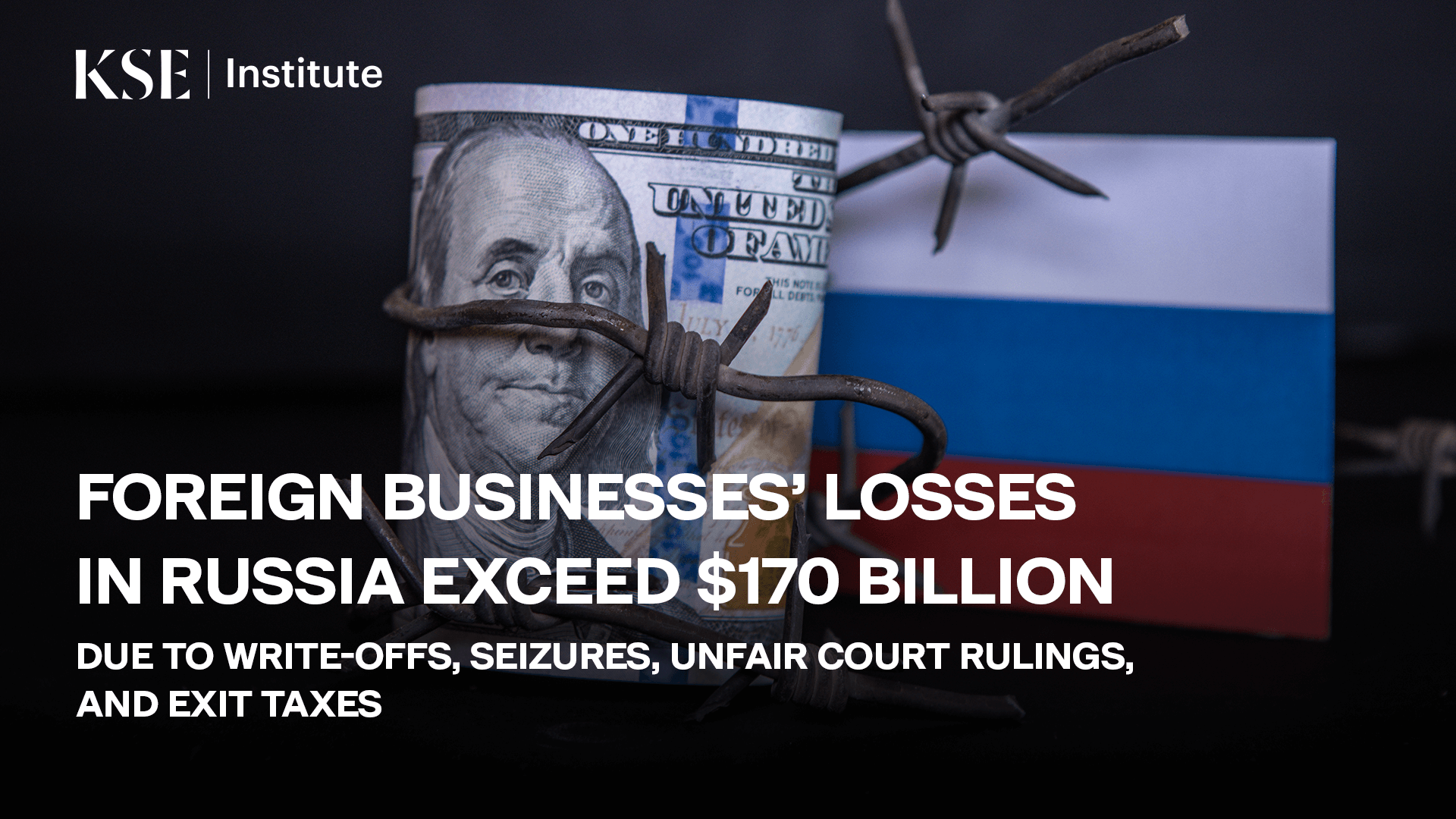- Kyiv School of Economics
- About the School
- News
- Foreign businesses’ direct losses in Russia exceed $170 billion due to write-offs, seizures, unfair court rulings, and exit taxes – KSE Institute study
Foreign businesses’ direct losses in Russia exceed $170 billion due to write-offs, seizures, unfair court rulings, and exit taxes – KSE Institute study
5 March 2025

Since the beginning of the full-scale invasion, over 1,300 international companies have scaled down or ceased their operations in Russia. According to the study “Assessing foreign companies’ direct losses in Russia: financial impact, market consequences, and strategic adjustments”, conducted by KSE Institute, the total confirmed financial losses of foreign businesses have exceeded $170 billion.
The majority of these losses stem from asset write-offs, totaling over $167 billion. Of this amount, more than $57 billion comes from companies whose assets were seized by Russian authorities and transferred to local businesses or state institutions, despite their estimated market value being around $74 billion before expropriation. Additionally, companies were forced to pay at least $3 billion in “exit taxes,” which became a mandatory condition for asset sales and saw a significant increase starting in 2023.
The most affected companies are based in the United States ($46 billion), Germany ($44.5 billion), the United Kingdom ($35.1 billion), France ($12.1 billion), Austria ($6.7 billion), and Finland ($5.1 billion).
Some of the largest financial losses include British Petroleum (BP) writing off $25.5 billion following its exit from Rosneft, the nationalization of Uniper ($22 billion) and Fortum ($4.07 billion), ExxonMobil’s $4 billion write-off, Renault’s forced sale of its Russian business ($2.4 billion), and Société Générale’s exit from Rosbank ($3.3 billion loss).
The sale of foreign companies’ assets in Russia frequently occurred at severe discounts of up to 90–100% below their market value. The Kremlin and affiliated business groups took advantage of this situation, acquiring international corporations’ assets at nominal prices.
Russia has systematically used economic pressure mechanisms. At least 30 companies have fallen victim to forced asset seizures, including Carlsberg, Danone, Fortum, Wintershall Dea, Uniper, and ExxonMobil.
In 2023, companies paid $1.2 billion in exit taxes, while by July 2024, they had paid an additional $1.5 billion (equivalent in dollars based on the exchange rate at the time). Total tax burdens from forced exits have exceeded $3 billion. In many cases, leaving the Russian market was accompanied by frozen profits and asset transfers to Russian-controlled entities.
The largest financial losses were in the Energy sector, where the total write-offs of BP, ExxonMobil, Fortum, TotalEnergies, and Uniper exceeded $60 billion.
In the Automotive industry, Renault lost $2.4 billion, with Volkswagen and Nissan also suffering significant losses. In finance, Société Générale incurred $3.3 billion in losses, while UniCredit and Raiffeisen Bank faced large-scale lawsuits and asset devaluations.
In the Consumer goods sector, McDonald’s, Nestlé, Unilever, Danone, and Carlsberg either exited the market or sold their assets at minimal prices.
As of early March 2025, 481 companies have fully exited the Russian market. Another 1,357 businesses have scaled down operations or are in the process of leaving. Meanwhile, over 2,260 international companies continue operating in Russia with no significant changes, generating profits and paying taxes to the Russian state budget.
According to the KSE Institute, the departure of international companies further isolates Russia economically. The country has lost a significant share of foreign investment, while its economy is becoming increasingly dependent on state control and Chinese businesses.
